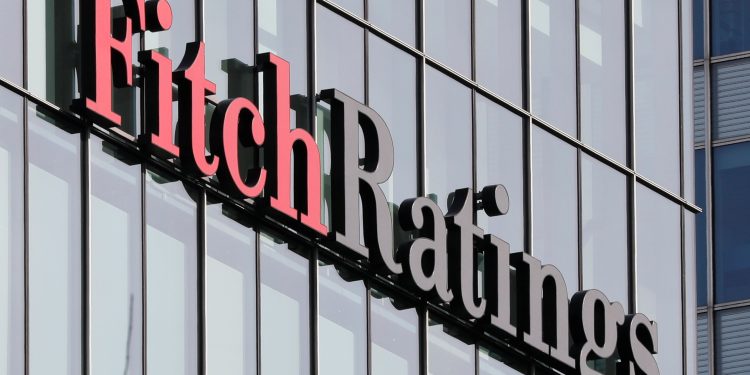Fitch Ratings has upgraded Ghana’s Long-Term Local-Currency Issuer Default Rating (IDR) to ‘CCC’ from ‘RD’. Fitch typically does not assign Outlooks to sovereigns with a rating of ‘CCC+’ or below.
Fitch has also affirmed Ghana’s Long-Term Foreign-Currency IDR at ‘RD’ and the Country Ceiling at ‘B-‘. Fitch has assigned ‘CCC’ ratings to two interest-only bonds issued on completion of pension funds holdings of the domestic debt exchange. Fitch has also assigned ‘CCC’ ratings to four domestic US dollar-denominated bonds issued on 4 September 2023.
Key Rating Drivers
Domestic Debt Exchanges Completed: The upgrade of Ghana’s Long-Term Local-Currency IDR follows the completion of the domestic debt exchange programme. Fitch considers that as a result of a series of domestic debt exchanges, Ghana has normalised relations with a significant majority of local-currency creditors, with a participation rate of 92% on local-currency government bonds (with similarly participation for Cocobills and locally issued foreign-currency bonds). Some non-participating bondholders are domestic individual bondholders, for which the authorities have publicly stated being current on the payments following a memorandum of understanding signed in May 2023.
Sizeable Debt Service Reduction: The local-currency debt exchanges represent a debt service reduction of GHS52 billion in 2023 (6% of estimated 2023 GDP or 39% of estimated 2023 revenue and grants). According to the IMF, debt service represented 117% of revenue in 2022. Of this total debt service reduction, we estimate the interest payment reduction in 2023 amounts to 1.8% of GDP or 12% of revenue and grants.
The domestic US dollar-denominated debt exchange adds another GHS5 billion (0.6% of GDP, 4% of revenue and grants) debt service reduction in 2023, and a further reduction is coming from the 50% principal haircut agreed with Bank of Ghana on its holdings of GHS71 billion local-currency non-marketable debt. These debt exchanges have brought down interest payments to a still high 38% of revenue and grants in 2023, from 47% in 2022 (commitment basis, including interest payments that are due in 2023 on external debt). Fitch considers another round of local-currency debt exchange as unlikely in the near term.
Post-Restructuring Bonds at ‘CCC’: Fitch has assigned ‘CCC’ issue ratings to two interest-only bonds that were issued to pension funds and to four domestic US dollar-denominated bonds, all issued as part of the domestic debt exchanges. Fitch has also affirmed the ‘CCC’ issue rating on local-currency bonds that it assigned on 22 March 2023. In August, Ghana made timely first coupon payments on these “new” bonds.
Eurobond Default Continues: In October, the Ministry of Finance announced its plans for external debt restructuring parameters scenarios for bondholders, involving a nominal haircut of 30% to 40%, coupons of no more than 5% and maturities of up to 20 years, potentially considering value recovery instruments. According to the authorities, these parameters, together with domestic debt restructuring and planned fiscal consolidation, would enable Ghana to reach a moderate risk of debt distress in the IMF/World Bank debt sustainability assessment by 2028.
Ghana is looking to restructure USD20 billion of external debt, including official bilateral debt, export credit agencies-backed commercial loans, Eurobonds and non-insured commercial loans, under the G20 Common Framework. Financing assurances from the official creditor committee (OCC) were provided in May 2023. Under its baseline scenario, Fitch expects Ghana to reach an agreement with private creditors by mid-2024, following an agreement with the OCC.
SLA Reached on First Review: In October, the IMF and Ghana reached a staff-level agreement (SLA) on the first review of the three-year Extended Credit Facility. As one of the requirements, monetary financing of the fiscal deficit ended in May 2023. IMF board approval of the first review, which would permit a USD600 million disbursement, is pending agreement between Ghana and the OCC.
Fiscal Consolidation Under Way: As part of the IMF programme, Ghana has committed to undertake a primary fiscal adjustment (commitment basis) of 5.1pp of GDP by 2026 compared with 2022. Fitch estimates the primary fiscal adjustment to reach 3.1pp in 2023, bringing the primary deficit to 0.6% of GDP from 3.7% in 2022, driven by reductions of capital expenditure, the wage bill and other current expenditure, including transfers to the energy and financial sectors. We project the primary fiscal balance to improve further by about 2pp by 2025, equally split between increased revenue collection and expenditure rationalisation, thus reaching a 1.2% of GDP surplus in 2025.
Public Debt Expected to Decline: Fitch anticipates a decline in general government debt to 87% of GDP at end-2023, from 89% in 2022, driven by the 50% haircut on Bank of Ghana’s holdings of non-marketable debt, which represents a debt reduction of 4.2% of estimated 2023 GDP. Fitch expects this will be partly offset by 33% year-on-year cedi depreciation compared with end-2022 and the primary deficit.
Assuming a 30% haircut on external debt considered for the restructuring, year-on-year cedi depreciation of 20% in 2024 and 9% in 2025 and a GDP deflator of 21% and 10% respectively, public debt would fall to 78% by 2025, although there is a high degree of uncertainty surrounding the definitive external debt restructuring parameters.
Current Account in Surplus: Non-payment of interest on selected external debt pending a restructuring and a marked reduction in merchandise imports will contribute to an expected current account surplus of 1.1% of GDP in 2023 compared with a 2.1% deficit in 2022. We forecast the current account to remain in surplus in 2024 and 2025, at 1.2% of GDP and 1.8%, respectively, although this forecast is subject to developments in the external debt restructuring.
Current account surpluses and projected disbursements from international financial institutions will increase Bank of Ghana’s foreign reserves by an estimated USD1.1 billion per year in 2023-2025, after a USD4.4 billion fall in 2022, reaching USD7.7 billion (about three months of current external payments) in 2025, from 1.6 months in 2022.
Partially Guaranteed Notes Affirmed: Fitch has affirmed the issue rating on Ghana’s US dollar-denominated notes due October 2030 at ‘CC’. The notes benefit from a partial credit guarantee backed by the International Development Association (IDA) for scheduled debt service payments up to 40% of the outstanding principal amount, or USD372 million, representing 3.5 years of full interest payments. IDA paid USD99.975 million to cover interest payments in April and October.
The notes are part of the current external debt moratorium and will be included in the external debt restructuring. However, the IDA guarantee provides additional liquidity for debt service over the next 3.5 years, and could lead to higher recoveries.
ESG – Governance: Ghana has an ESG Relevance Score (RS) of ‘5’ for both Political Stability and Rights and for the Rule of Law, Institutional and Regulatory Quality and Control of Corruption. Theses scores reflect the high weight that the World Bank Governance Indicators (WBGI) have in our proprietary Sovereign Rating Model. Ghana has a medium WBGI ranking at 50.5 reflecting a recent track record of peaceful political transitions, a moderate level of rights for participation in the political process, moderate institutional capacity, established rule of law and a moderate level of corruption.
ESG – Creditor Rights: Ghana has an ESG Relevance Score (RS) of ‘5’ for Creditor Rights as willingness to service and repay debt is highly relevant to the rating and is a key rating driver with a high weight. The rating on Ghana’s LTFC IDR reflects Fitch’s view that Ghana is in default.
RATING SENSITIVITIES
Factors that Could, Individually or Collectively, Lead to Negative Rating Action/Downgrade
– Renewed liquidity pressures, for example, as a result of significant delays in the external debt restructuring process, that increase the probability of further restructuring or a default on local-currency debt.
Factors that Could, Individually or Collectively, Lead to Positive Rating Action/Upgrade
– Once Ghana reaches an agreement with private creditors on the restructuring of its foreign-currency-denominated external debt and completes that restructuring process Fitch will assign a Long-Term Foreign-Currency IDR based on a forward-looking assessment of its willingness and capacity to honour its foreign-currency debt.
Sovereign Rating Model (SRM) and Qualitative Overlay (QO)
Fitch’s proprietary SRM assigns Ghana a score equivalent to a rating of ‘CCC+’ on the Long-Term Foreign-Currency IDR scale. However, in accordance with its rating criteria, Fitch’s sovereign rating committee has not utilised the SRM and QO to explain the ratings in this instance. Ratings of ‘CCC+’ and below are instead guided by the rating definitions.
Fitch’s SRM is the agency’s proprietary multiple regression rating model that employs 18 variables based on three-year centred averages, including one year of forecasts, to produce a score equivalent to a LT FC IDR. Fitch’s QO is a forward-looking qualitative framework designed to allow for adjustment to the SRM output to assign the final rating, reflecting factors within our criteria that are not fully quantifiable and/or not fully reflected in the SRM.
Country Ceiling
The Country Ceiling for Ghana is ‘B-‘. For sovereigns rated ‘CCC+’ and below, Fitch assumes a starting point of ‘CCC+’ for determining the Country Ceiling. Fitch’s Country Ceiling Model produced a starting point uplift of zero notch above the IDR. Fitch’s rating committee applied a qualitative adjustment of +1 notch to the model result under the balance of payments restrictions pillar, to reflect that the private sector has not been prevented or significantly impeded from converting local currency into foreign currency and transferring the proceeds to non-resident creditors to service debt payments.
Fitch does not assign Country Ceilings below ‘CCC+’, and only assigns a Country Ceiling of ‘CCC+’ in the event that transfer and convertibility risk has materialised and is impacting the vast majority of economic sectors and asset classes.
REFERENCES FOR SUBSTANTIALLY MATERIAL SOURCE CITED AS KEY DRIVER OF RATING
The principal sources of information used in the analysis are described in the Applicable Criteria.
ESG Considerations
Ghana has an ESG Relevance Score of ‘5’ for Political Stability and Rights as World Bank Governance Indicators have the highest weight in Fitch’s SRM and are therefore highly relevant to the rating and a key rating driver with a high weight. As Ghana has a percentile rank below 50 for the respective Governance Indicator, this has a negative impact on the credit profile.
Ghana has an ESG Relevance Score of ‘5’ for Rule of Law, Institutional and regulatory Quality and Control of Corruption as World Bank Governance Indicators have the highest weight in Fitch’s SRM and are therefore highly relevant to the rating and are a key rating driver with a high weight. As Ghana has a percentile rank below 50 for the respective Governance Indicators, this has a negative impact on the credit profile.
Ghana has an ESG Relevance Score of ‘4[+]’for Human Rights and Political Freedoms as the Voice and Accountability pillar of the World Bank Governance Indicators is relevant to the rating and a rating driver. As Ghana has a percentile rank above 50 for the respective Governance Indicator, this has a positive impact on the credit profile.
Ghana has an ESG Relevance Score of ‘5’ for Creditor Rights as willingness to service and repay debt is relevant to the rating and is a rating driver for Ghana, as for all sovereigns. The default on the foreign-currency-denominated debt reflected in the LTFC IDR at ‘RD’ has a negative impact on the credit profile.
The highest level of ESG credit relevance is a score of ‘3’, unless otherwise disclosed in this section. A score of ‘3’ means ESG issues are credit-neutral or have only a minimal credit impact on the entity, either due to their nature or how they are being managed by the entity.















